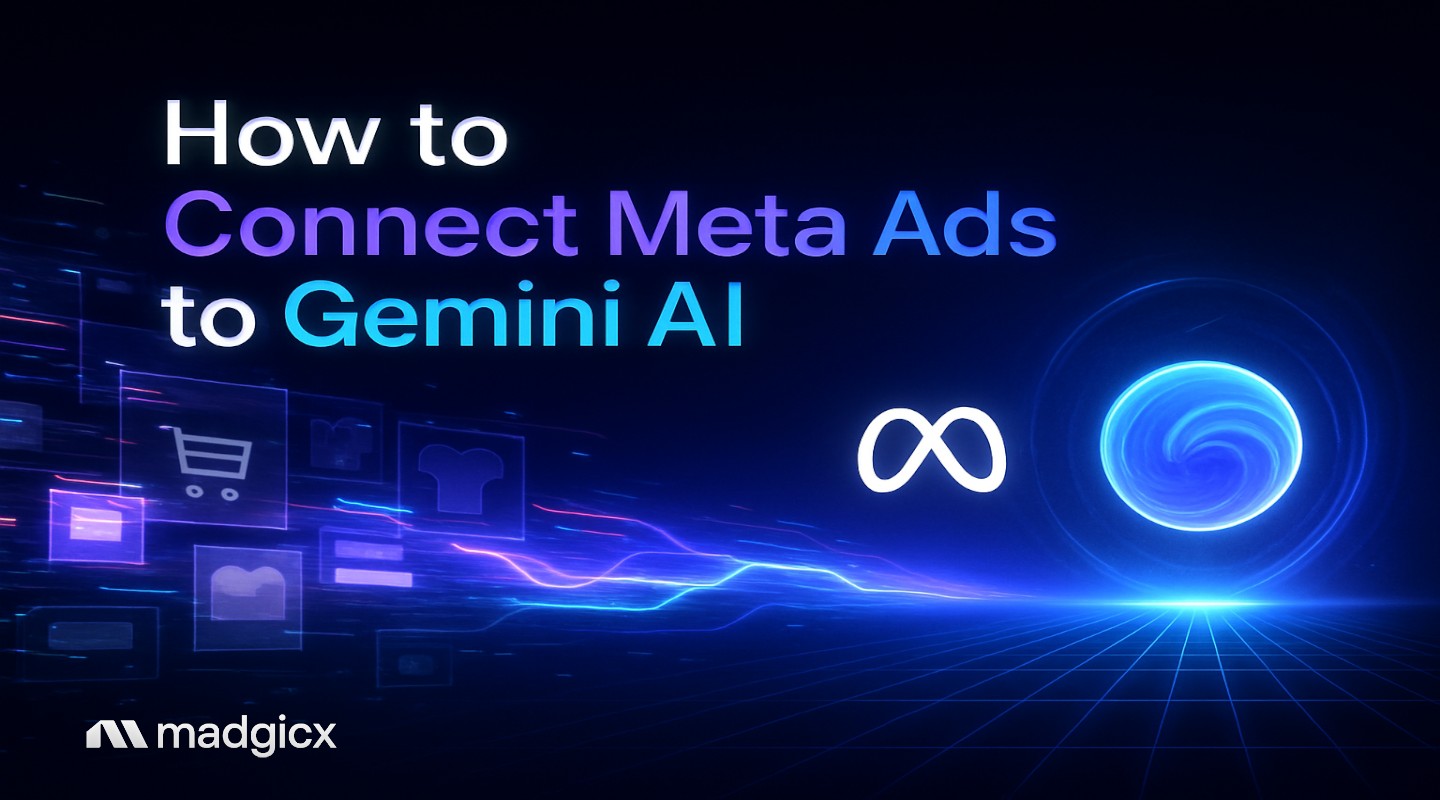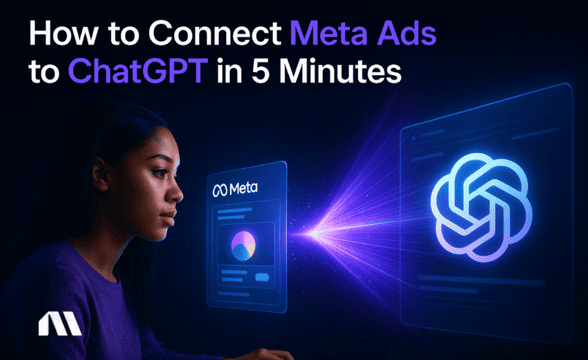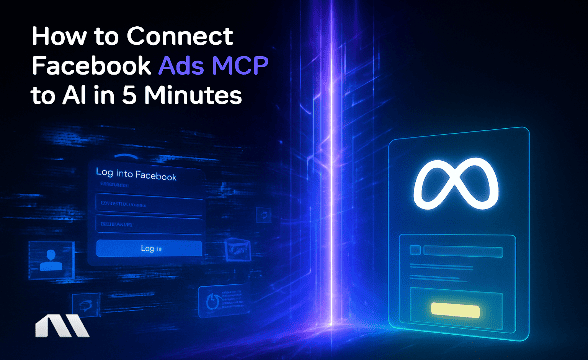Learn how to connect Meta Ads to Gemini AI today. Step-by-step integration guide, optimization strategies, and preparation tips for e-commerce success in 2025.
Picture this: You're scrolling through your morning news when you see a headline that makes you pause mid-coffee sip. Meta is in talks with Google to integrate Gemini AI models directly into their advertising platform.
According to Reuters, Meta employees have proposed fine-tuning Google's Gemini models on Meta's ad data to improve targeting capabilities. For e-commerce owners like yourself, this isn't just tech news – it's a glimpse into the future of advertising that could significantly enhance how you reach customers.
Here's the thing though: while this direct integration is still in development (and knowing how these tech partnerships go, it could be months or even years away), smart e-commerce owners aren't sitting around waiting. They're already connecting their Meta Ads to AI tools that give them a competitive advantage today and position them perfectly for when the official partnership launches.
The reality is that 4 million+ advertisers are already using Meta's AI tools, and Meta's Advantage+ campaigns are generating a $20 billion annual run rate with 70% year-over-year growth. The AI advertising revolution isn't coming – it's already here. The question is: are you ready to be part of it?
What You'll Learn
By the end of this guide, you'll know exactly how to connect Meta Ads to Gemini AI using current integration methods. You'll understand why preparing now gives you a competitive advantage, and have a clear roadmap for when the official integration launches.
Plus, I'll show you how platforms like Madgicx are already delivering the AI optimization benefits you're looking for.
Understanding the Meta-Gemini Partnership Opportunity
Let's start with what we actually know about this partnership. The discussions between Meta and Google aren't just casual coffee chats – they represent a significant development in advertising AI.
Meta's advertising revenue surpassed $160 billion, representing 98.7% of their total revenue, so when they're exploring AI partnerships, you know they're serious about maintaining their dominance.
The proposed integration would allow Meta to fine-tune Gemini's language models specifically on Meta's advertising data. Think about what that means for your e-commerce store: AI that understands not just general language patterns, but the specific nuances of what makes people click "buy now" on Facebook and Instagram.
But here's where it gets interesting for forward-thinking e-commerce owners. While we don't have an official timeline (and tech partnerships can take years to fully materialize), the groundwork you lay today will determine how quickly you can capitalize on these capabilities when they arrive.
The businesses that are already experimenting with AI integrations, optimizing their data structures, and understanding how AI-powered advertising works will have a meaningful advantage. They'll know what works, what doesn't, and how to scale quickly when the official tools launch.
Pro Tip: Start organizing your campaign data now with clear naming conventions and proper tracking. When AI tools analyze your campaigns, clean data structure makes all the difference in the quality of insights you receive.
Current Methods to Connect Meta Ads to Gemini AI
Now, let's get practical. You can't wait for Meta and Google to figure out their partnership timeline, but you can absolutely start connecting your Meta Ads to Gemini AI today using third-party integration platforms.
The most accessible approach is through workflow automation platforms like Zapier, Pabbly Connect, or n8n. These platforms act as bridges, allowing you to send your Meta Ads data to Google's AI services and receive optimization insights back. For more advanced setups, you can also explore our detailed guide on Meta Ads n8n integration.
Another route is through API-based connections using Google Cloud Platform. This requires more technical setup but gives you greater control over data flow and processing. You can pull campaign performance data from Meta's Marketing API, process it through Gemini's AI models, and feed insights back into your campaign optimization workflow.
The key is starting with your current data structure. If your campaigns are already well-organized with clear naming conventions and proper tracking, integrating AI tools becomes much smoother. If your account is a mess of randomly named campaigns and inconsistent tracking, now's the time to clean house.
Step-by-Step Integration Guide
Pro Tip: Start with the simplest integration method first – you can always upgrade to more sophisticated setups as you get comfortable with the workflow.
Method 1: Using Zapier Integration
Account Setup Requirements:
First, you'll need active accounts on Meta Business Manager, Google Cloud Platform (with Gemini API access), and Zapier. Make sure your Meta Ads account has proper admin permissions and that your Google Cloud billing is set up correctly.
Trigger Configuration:
Set up a Zapier trigger that monitors your Meta Ads performance data. You can configure it to pull daily performance metrics, new campaign data, or specific events like when ad spend reaches certain thresholds.
The trigger should capture key metrics like:
- Cost per acquisition
- Return on ad spend
- Conversion rates
- Click-through rates
Data Flow Setup:
Configure the middle step to send this Meta Ads data to Gemini AI for analysis. You'll want to structure your prompts to ask specific questions about optimization opportunities, audience insights, or creative recommendations.
For example: "Based on this campaign performance data, what audience adjustments would improve ROAS?"
Testing and Optimization:
Start with a small test campaign to validate your integration. Monitor the AI recommendations against your actual campaign performance to build confidence in the insights. Gradually expand to more campaigns as you refine your prompts and data flow.
Method 2: n8n Workflow Automation
For those wanting more control and customization, n8n offers a powerful alternative. You can create sophisticated workflows that not only connect Meta Ads to Gemini but also integrate with your e-commerce platform, email marketing tools, and analytics systems.
Advanced Automation Setup:
Build workflows that automatically analyze campaign performance, generate optimization recommendations, and even implement certain changes automatically. This approach requires more initial setup but provides greater flexibility and cost efficiency for larger operations.
Custom Workflow Creation:
Design workflows specific to your business needs. Maybe you want AI analysis of your top-performing ad creative, or automated audience expansion recommendations based on conversion patterns. The possibilities are extensive when you control the entire workflow.
Performance Monitoring:
Set up monitoring systems within your n8n workflows to track the effectiveness of AI recommendations. This data becomes invaluable for refining your integration and proving ROI.
Optimizing Your AI-Enhanced Meta Campaigns
Once you have data flowing between Meta Ads and Gemini AI, the optimization opportunities emerge. AI can help identify patterns that may be difficult to spot manually, especially when analyzing large datasets across multiple campaigns.
Best Practices for AI-Powered Targeting
Focus on feeding the AI clean, structured data about your best-performing campaigns. The quality of insights you receive directly correlates with the quality of data you provide. Include context about your business goals, target margins, and seasonal patterns.
For those looking to dive deeper into AI-powered advertising strategies, our guide on agentic marketing explores how autonomous AI agents are reshaping campaign management.
Key data points to include:
- Customer lifetime value by acquisition source
- Seasonal performance patterns from previous years
- Product margin information for ROAS optimization
- Geographic performance data for location targeting
Creative Optimization with AI Insights
Use AI analysis to understand what creative elements drive the best performance. Gemini can analyze your ad copy, identify successful patterns, and suggest variations that maintain your brand voice while improving engagement.
The AI can help you identify:
- High-performing headline structures
- Emotional triggers that drive conversions
- Visual elements that increase click-through rates
- Call-to-action phrases that improve conversion rates
Performance Monitoring and Adjustment
Set up regular review cycles where you analyze AI recommendations against actual performance. This helps you understand which types of AI insights provide the most value for your specific business and audience.
Quick Tip: Focus on data quality – AI tools perform better with clean, structured campaign data that includes proper UTM parameters and conversion tracking.
Preparing for the Official Meta-Gemini Integration
While you're experimenting with current integration methods, it's smart to structure your campaigns and data in ways that will make the transition to official integration smoother.
Campaign Structure Optimization
Organize your campaigns with clear, descriptive naming conventions that AI can easily understand. Use consistent campaign objectives and ensure your conversion tracking is properly implemented across all touchpoints.
Best practices include:
- Consistent naming conventions across all campaigns
- Proper audience segmentation with clear labels
- UTM parameter standardization for tracking
- Conversion event optimization for key business goals
Data Organization Best Practices
Implement proper data hygiene practices now. This means consistent UTM parameter usage, proper audience segmentation, and clean product catalogs. When the official integration launches, you'll want your data ready for AI analysis without months of cleanup work.
Essential data organization steps:
- Standardize product catalogs with consistent naming
- Implement proper pixel tracking across all pages
- Create audience segments based on behavior and value
- Document campaign strategies for AI context
Competitive Positioning Strategies
Start building your understanding of AI-optimized advertising now. The businesses that understand how to work with AI tools effectively will have an advantage when new integrations become available.
Pro Tip: Document your current optimization processes and results. This historical data will be invaluable for training AI models and measuring improvement when new integrations launch.
Alternative AI Solutions for Meta Ads
Here's where I need to be honest with you: while connecting Meta Ads to Gemini AI is exciting, you don't have to wait for complex integrations to start benefiting from AI-powered advertising optimization.
Madgicx's AI Marketer is already providing many of the benefits you're looking for from a Meta-Gemini integration. It performs daily account audits automatically, provides actionable optimization recommendations, and offers one-click implementation of suggested changes.
The platform monitors your accounts 24/7 to prevent wasted ad spend and identifies scaling opportunities that human analysis might miss. It reduces time spent on manual tasks while improving campaign performance through intelligent automation.
Why Purpose-Built AI Matters
The advantage of using a dedicated advertising AI platform like Madgicx is that it's specifically designed for Meta Ads optimization. While Gemini is a general-purpose AI model, Madgicx's AI has been trained specifically on advertising data and optimization patterns.
It understands:
- Facebook's algorithm nuances and how they change
- Seasonal advertising patterns across different industries
- E-commerce conversion optimization strategies
- Budget allocation strategies for maximum ROI
When the official Meta-Gemini integration eventually launches, having experience with AI-powered advertising optimization will make you a more sophisticated user of those new capabilities. You'll understand how to interpret AI recommendations, when to implement suggestions, and how to measure the impact of AI-driven changes.
If you're interested in exploring how AI can enhance your current advertising data analysis, check out our guide on how to chat with your Meta Ads data for immediate insights.
Measuring Success and ROI
The key to successful AI integration is measuring the right metrics and understanding the impact of AI-driven optimizations on your bottom line.
Key Metrics to Track
Focus on metrics that directly impact your business goals: return on ad spend (ROAS), cost per acquisition (CPA), and lifetime value of acquired customers. Also track operational metrics like time saved on campaign management and the accuracy of AI recommendations.
Primary performance indicators:
- ROAS improvement compared to manual optimization
- CPA reduction across campaign types
- Time savings on campaign management tasks
- Accuracy rate of AI recommendations implemented
Performance Benchmarks
Establish baseline performance metrics before implementing AI integrations. This allows you to measure the actual impact of AI optimization on your campaigns. Track both immediate performance improvements and longer-term trends.
Create benchmarks for:
- Monthly ROAS averages by campaign type
- Weekly optimization time spent on accounts
- Campaign setup speed for new launches
- Scaling success rates for winning campaigns
Optimization Strategies
Use AI insights to inform broader strategic decisions, not just tactical campaign adjustments. For example, if AI analysis reveals that certain product categories perform better with specific audience segments, use that insight to inform your overall marketing strategy and product development.
With 1 billion+ monthly users already engaging with Meta AI, the platform is clearly committed to AI integration across all their products. This massive user base provides Meta with unprecedented data for training AI models, which will ultimately benefit advertisers through better targeting and optimization capabilities.
Pro Tip: Set up automated reporting that combines AI recommendations with actual performance data. This creates a feedback loop that improves both your decision-making and the AI's future recommendations.
Frequently Asked Questions
When will Meta officially integrate with Gemini AI?
While Meta is in discussions with Google, no official timeline has been announced. Current reports suggest this is still in early development phases. However, you can start preparing and benefiting from AI optimization today using current integration methods.
Can I use these integration methods for my Shopify store?
Yes, these integration methods work with any e-commerce platform, including Shopify, WooCommerce, BigCommerce, and others. The key is having proper conversion tracking and data flow between your store and advertising accounts.
Will these integrations affect my current Meta Ads performance?
When set up correctly, these integrations should enhance rather than disrupt your current campaigns by providing additional optimization insights. Start with small test campaigns to validate the integration before scaling.
How much does it cost to set up these integrations?
Costs vary by platform – Zapier starts at $20/month for basic automation, while n8n offers free self-hosted options. Google Cloud API usage is typically minimal for most e-commerce operations. The ROI typically justifies the investment through improved campaign performance and time savings.
Should I wait for the official Meta-Gemini integration instead?
No – starting with current integration methods helps you develop AI-optimized workflows and data structures that will make the transition to official integration smoother. Plus, you'll benefit from AI optimization immediately rather than waiting for an uncertain timeline.
How does this compare to using Madgicx's AI features?
Madgicx provides purpose-built AI optimization for Meta Ads that's available today, while Gemini integrations offer more general AI capabilities that require custom setup. Many advertisers use both approaches – Madgicx for day-to-day optimization and custom AI integrations for specific analysis needs.
Start Your AI Advertising Journey Today
The Meta-Gemini partnership represents an exciting future for AI-powered advertising, but you don't have to wait to start benefiting from AI optimization. By implementing current integration methods and using platforms like Madgicx's AI Marketer, you're positioning your e-commerce store ahead of competitors who are waiting on the sidelines.
The businesses that succeed in the AI advertising era won't be those with the most advanced technology – they'll be those that start experimenting, learning, and optimizing today. Whether you choose to build custom integrations with Gemini AI, leverage existing AI advertising platforms, or combine both approaches, the important thing is to start.
Your competitors are already exploring AI optimization – make sure you're not left behind when the next wave of advertising technology arrives.
While you're waiting for the Meta-Gemini integration, Madgicx's AI Marketer can already provide the automated optimization and intelligent targeting that will prepare your store for the AI-enhanced advertising future. Get 24/7 AI management of your campaigns today.
Digital copywriter with a passion for sculpting words that resonate in a digital age.







.avif)







